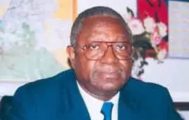Categories
Recent Posts
- Ukraine: Trump blames Zelensky for starting war after massive Russian attack
- Minister Obi Eta Jerome’s death – What do we know?
- Pope Francis transfers Cameroonian-born Nigerian Apostolic Nuncio in Sri Lanka to Ethiopia
- CDC banana exports hit 10,400 tons in Q1 2025
- Algeria to expel 12 French embassy officials
Archives
- April 2025
- March 2025
- February 2025
- January 2025
- December 2024
- November 2024
- October 2024
- September 2024
- August 2024
- July 2024
- June 2024
- May 2024
- April 2024
- March 2024
- February 2024
- January 2024
- December 2023
- November 2023
- October 2023
- September 2023
- August 2023
- July 2023
- June 2023
- May 2023
- April 2023
- March 2023
- February 2023
- January 2023
- December 2022
- November 2022
- October 2022
- September 2022
- August 2022
- July 2022
- June 2022
- May 2022
- April 2022
- March 2022
- February 2022
- January 2022
- December 2021
- November 2021
- October 2021
- September 2021
- August 2021
- July 2021
- June 2021
- May 2021
- April 2021
- March 2021
- February 2021
- January 2021
- December 2020
- November 2020
- October 2020
- September 2020
- August 2020
- July 2020
- June 2020
- May 2020
- April 2020
- March 2020
- February 2020
- January 2020
- December 2019
- November 2019
- October 2019
- September 2019
- August 2019
- July 2019
- June 2019
- May 2019
- April 2019
- March 2019
- February 2019
- January 2019
- December 2018
- November 2018
- October 2018
- September 2018
- August 2018
- July 2018
- June 2018
- May 2018
- April 2018
- March 2018
- February 2018
- January 2018
- December 2017
- November 2017
- October 2017
- September 2017
- August 2017
- July 2017
- June 2017
- May 2017
- April 2017
- March 2017
- February 2017
- January 2017
- December 2016
- November 2016
- October 2016
- September 2016
- August 2016
- July 2016
- June 2016
Featured
 Burkina Faso: Where vision meets discipline
Burkina Faso: Where vision meets discipline  Prosecution of journalists in Cameroon: European Parliament says enough red flags have been ignored
Prosecution of journalists in Cameroon: European Parliament says enough red flags have been ignored  1982-2025: How long will Biya hang on?
1982-2025: How long will Biya hang on?  How Biya and Archbishop Nkea protected the sanctity of the family in Cameroon
How Biya and Archbishop Nkea protected the sanctity of the family in Cameroon  October Presidential Election: Will 92-year-old Biya be re-elected?
October Presidential Election: Will 92-year-old Biya be re-elected?
Most Commented Posts
 4 Anglophone detainees killed in Yaounde
4 Anglophone detainees killed in Yaounde
18 comments Chantal Biya says she will return to Cameroon if General Ivo Yenwo, Martin Belinga Eboutou and Ferdinand Ngoh Ngoh are sacked
Chantal Biya says she will return to Cameroon if General Ivo Yenwo, Martin Belinga Eboutou and Ferdinand Ngoh Ngoh are sacked
13 comments The Anglophone Problem – When Facts don’t Lie
The Anglophone Problem – When Facts don’t Lie
12 comments Anglophone Nationalism: Barrister Eyambe says “hidden plans are at work”
Anglophone Nationalism: Barrister Eyambe says “hidden plans are at work”
12 comments Largest wave of arrest by BIR in Bamenda
Largest wave of arrest by BIR in Bamenda
10 comments
Latest Tweets
Featured
-

Ukraine: Trump blames Zelensky for starting war after massive Russian attack
-

Minister Obi Eta Jerome’s death – What do we know?
-

Pope Francis transfers Cameroonian-born Nigerian Apostolic Nuncio in Sri Lanka to Ethiopia
-

CDC banana exports hit 10,400 tons in Q1 2025
-

Algeria to expel 12 French embassy officials
-

US: 7 900 Cameroonians face deportation
-

Burkina Faso: Where vision meets discipline
© Cameroon Concord News 2025
8, April 2021
CEMAC region is hosting the world’s longest-standing authoritarian rulers! But protests are growing 0
In a familiar pattern than continues to be repeated, President Idriss Déby looks set to be elected for yet another term in Chad following this Sunday’s presidential elections. In power since 1990, this will be the 68-year-old incumbent’s sixth term.
President Déby’s victory at the ballot box may be all but assured, but that’s not to say he doesn’t face significant opposition. When he was nominated to be the ruling Patriotic Salvation Movement’s flagbearer this February, the announcement sparked widespread demonstrations. In the capital N’Djamena and other major cities, protesters took to the streets chanting “no to a sixth term!” and “Leave, Déby!”.
The government has responded with force. Authorities arrested hundreds of protesters. They charged several with assault and disturbing the public order. In anticipation of more street action, authorities also imposed a blanket ban on protests. Internet restrictions are expected to follow.
This is all characteristic of Déby’s repressive rule and management of the upcoming elections. For years, his government has overseen sustained attacks against human rights defenders, opposition politicians and journalists. One of Chad’s most prominent human rights defender, Baradine Berdeï Targuio, has been detained since January 2020 charged with “subversive activities on social media”. In November 2020, security forces surrounded the premises of several opposition parties and civil society groups, and raided private radio stations including Radio FM Liberté.
Amid this increasingly unequal playing filed, Chad’s main opposition leader, Saleh Kebzabo, quit the presidential race in early-March. His decision came shortly after two people were killed as security forces tried to arrest his fellow opposition leader Yaya Dillo.
A regional problem
Since he came to power via a coup in 1990, President Déby has won every election and amended the constitution twice to facilitate his stay in power. His 2005 constitutional revision removed the two-term limit. The 2018 amendments re-imposed it, but ensured it would not apply retroactively while also extending presidential mandates from five years to six. This means Déby could now stay in power until 2033.
This determination to cling onto power, along with the brutal treatment of opponents, is consistent with the broader picture in Central Africa. Throughout this region, politics has been militarised and electoral periods are characterised by violence and instability. Authorities target anyone who speaks out – from human rights organisations and the political opposition to trade unions – and presidents maintain a tight grip on power.
Equatorial Guinea’s Teodoro Obiang and Cameroon’s Paul Biya are two of the world’s longest serving presidents, having been in office for 42 and 39 years respectively. The Republic of Congo’s Denis Sassou Nguesso of the Republic of Congo is referred to by some as an “Emperor”, having ruled for 36 years over two periods. Gabon’s Ali Bongo has been president for a comparatively brief 12 years but was preceded by his father who ruled for the 42 years before that.
Along with undemocratic and repressive domestic policies, several Central African leaders’ stays in power have been made possible by international complicity. Chad is a strategic US ally in the campaign against Islamist insurgencies in the Chad Basin. Cameroon, Congo and Gabon are among the last bastions of French influence in Francophone Africa. The Central African Republic has presented a useful opportunity for Russia to expand its international standing.
These alliances of convenience have often provided authoritarian governments with crucial support and funding – some of which has financed security forces that then commit the same kinds of abuses as the groups they are meant to be targeting – while also shielding undemocratic leaders from international censure.
Pushing back
As seen in Chad, people across Central Africa are not staying silent. Civil society groups in the Congo and Cameroon, for example, are increasingly speaking out against state excesses and calling for political reforms, starting with free and fair elections and adherence to term limits. Despite the risks, protests against rising costs of living, increasing inequality and the monopolisation of power by ruling elites are growing. Repeats of Sudan’s 2019 uprising, which ended Omar al-Bashir’s three-decade reign, cannot be ruled out.
To support these movements and help reverse Central Africa’s authoritarian trend, regional and international civil society organisations should start building networks across the region. They should bolster groups that work on the ground to encourage people and governments to move towards democracy. At the same time, they should demand that foreign governments look beyond their own narrow strategic interests and recognise the impact of the militarisation of politics and the use of violence against civil society, the media and opposition.
Without this support, local civil society will struggle to push back against authoritarian leaders. They need broader support as they attempt to prevent leaders like President Déby extending his undemocratic rule and, in the longer-term, resist the plans of ageing presidents to follow in Gabon’s footsteps by converting their individual reign into dynastic rule, further extending the cycle of human rights violations and repression.
Culled from African Arguments